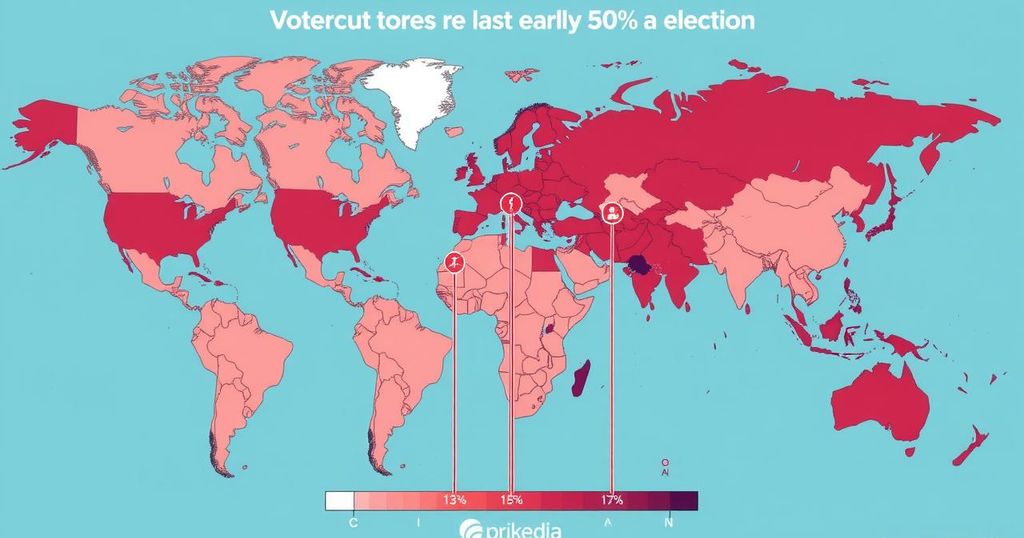In 2024, nearly half of the global population participated in elections across over 60 nations. Despite this historic turnout demonstrating the resilience of democracy, many voters prioritized personal and economic concerns, often overlooking broader issues such as climate change. Noteworthy electoral outcomes included Donald Trump’s return to the presidency, challenges for leaders like Macron and Modi, and alarming trends in authoritarian regimes like Russia. This year illustrates the complex interplay between domestic decisions and global impacts.
The year 2024 marked a significant milestone in global democracy, with over 60 countries representing almost half of the world’s population participating in elections. This unprecedented event revealed both the potential and limitations of democratic engagement. Sadly, many voters prioritized immediate personal interests over collective welfare, driven by fears and economic insecurities rather than visionary concerns like climate change.
In many industrialized nations, pressing economic challenges overshadowed broader issues. In the United Kingdom, Keir Starmer’s Labour Party triumphed, focusing on the current economic plight rather than future sustainability. Meanwhile, President Joe Biden faced backlash as inflation persisted and wages stagnated, prompting voters to seek change. Despite this, many elections demonstrated a commitment to democracy, as evidenced by both emerging and enduring democratic practices.
In nations from Algeria to Taiwan, the exercise of voting has become a widespread privilege, starkly contrasting past restrictions based on wealth or gender. However, numerous incumbents faced setbacks, including India’s Prime Minister Narendra Modi and South Africa’s ruling party, both losing significant support amid public dissatisfaction.
Notably, Donald Trump’s return to the presidency in the United States and Emmanuel Macron’s trial in France showcased shifting voter sentiments. Macron’s electoral gambit, made following significant populist gains in the European Parliament, aimed to challenge rising right-wing influence, yet it revealed vulnerabilities in his leadership amid economic hardships primarily caused by external factors.
Conversely, in Russia, Vladimir Putin’s overwhelming electoral support starkly illustrated the distortion of democratic principles, raising alarms about legitimacy and the chilling consequences of authoritarian rule. Trump’s electoral resurgence, coupled with concerns over the Ukraine conflict, highlighted a complex interplay between global democracies.
As 2024 unfolded, it became evident that domestic decisions have far-reaching international ramifications, mobilizing electorates around the globe. The principles of democracy faced both rigorous testing and promising expansion, suggesting a future where collective electoral power could redefine leadership globally. The twists and turns of these electoral outcomes emphasize the need for persistent engagement and thoughtful political discourse pervading the democratic experience.
In 2024, a historical surge in democratic participation occurred, with suffrage extended in over 60 countries comprising nearly half of the global populace. This moment represented a significant evolution in the democratic process, indicating a move towards greater inclusivity and involvement in governmental decision-making. However, the elections also highlighted underlying challenges, revealing a tendency for voters to focus on immediate personal concerns over broader collective interests, particularly in times of economic uncertainty. This trend is crucial to understand as it shapes the future of governance and the effectiveness of democracy worldwide.
The 2024 elections provided a dual narrative of promise and peril for global democracy. While the sheer number of voters showcased the resilience and evolution of democratic systems, the prevailing trends of self-interest and economic anxiety reveal the urgent need for broader societal perspectives. Leaders such as Trump and Macron face significant challenges, emphasizing the need for politicians to connect with their constituents on pressing issues. Ultimately, the mixture of hope and caution from these elections serves as a reminder of the constant evolution of democracy and its implications for societies around the world.
Original Source: www.cnn.com






